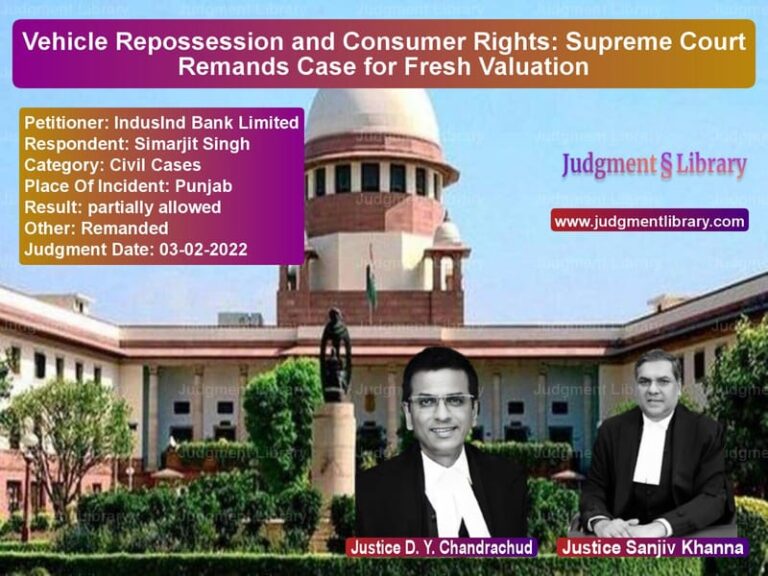Bank Negligence in Insurance Processing: Supreme Court Orders Full Compensation
The case of Hemiben Ladhabhai Bhanderi v. Saurashta Gramin Bank & Anr. is a significant ruling addressing consumer rights and banking negligence in handling insurance policies. The Supreme Court ruled on whether a bank’s failure to process an insurance application constituted a deficiency in service, and whether compensation should be awarded when the lapse led to the denial of an insurance claim. This case sets an important precedent for the responsibilities of banks in managing insurance-linked schemes.
Background of the Case
The dispute arose when the appellant’s husband, Ladhabhai Thakarsibhai Bhanderi, who was an account holder at Saurashta Gramin Bank, applied for an accident insurance policy through the bank’s scheme. The policy was administered in partnership with Oriental Insurance Company Limited and required applicants to submit a form and pay a premium of Rs. 100 to secure a cover of Rs. 5 lakh.
The deceased submitted his form on 21 July 2008. However, before the bank could process the policy, he was involved in an accident on 1 August 2008 and succumbed to his injuries on 11 August 2008. When his wife, the appellant, filed an insurance claim, it was rejected on the grounds that the bank had failed to forward the application and premium to the insurance company, making the policy invalid at the time of death.
Legal Issues Involved
- Whether the bank’s failure to process the insurance policy application constituted a deficiency of service under consumer protection laws.
- Whether the reduction of compensation by the National Consumer Disputes Redressal Commission (NCDRC) was justified.
- Whether the bank was solely responsible for the lapse leading to the denial of insurance coverage.
Petitioner’s Arguments
The appellant, through her legal counsel, argued:
- The bank was responsible for processing the insurance application but negligently failed to do so.
- The deceased had completed all formalities, and it was the bank’s duty to forward the premium to the insurer.
- The bank’s inaction directly caused the denial of the insurance claim, making it liable for compensation.
- The NCDRC’s decision to reduce the compensation from Rs. 5 lakh to Rs. 2 lakh was arbitrary and should be overturned.
Respondent’s Arguments
The bank countered these allegations, contending:
- The deceased initially submitted the application on 28 July 2008 but later withdrew it, delaying the process.
- The re-submission of the form occurred after office hours on 9 August 2008, making it impossible to forward it before his death.
- The bank was not liable, as it had no control over when the applicant chose to submit the form.
- The claim should be directed at the insurance company, not the bank.
Supreme Court’s Analysis
The Supreme Court examined the evidence and found serious deficiencies in the bank’s handling of the insurance application. Key findings included:
- The bank had processed applications from other customers on the same day but failed to do so for the deceased.
- The bank did not maintain proper records or issue receipts for received applications, making it difficult to verify its claims.
- As the scheme was bank-administered, the bank was responsible for ensuring that all valid applications were forwarded.
- The bank’s lapse was a clear deficiency of service under the Consumer Protection Act, 1986.
- The reduction of compensation by NCDRC was unjustified, as the appellant was entitled to the full insurance coverage amount.
Final Judgment
The Supreme Court ruled:
- The bank was found guilty of deficiency in service.
- The full compensation of Rs. 5 lakh was reinstated.
- The bank was ordered to pay the amount within 60 days, failing which it would accrue interest at 9% per annum.
- No additional costs were imposed on either party.
Impact of the Judgment
This ruling has significant implications for banking and consumer rights:
- It reinforces the responsibility of banks in processing insurance-linked applications.
- It prevents financial institutions from evading liability for lapses that directly impact consumers.
- It upholds consumer protection laws and ensures financial accountability.
- It discourages banks from administrative negligence that could deprive consumers of rightful claims.
By restoring the full compensation, the Supreme Court upheld consumer rights and reinforced accountability in financial transactions.
Petitioner Name: Hemiben Ladhabhai Bhanderi.Respondent Name: Saurashta Gramin Bank & Anr..Judgment By: Justice Dhananjaya Y Chandrachud, Justice Hemant Gupta.Place Of Incident: Jamnagar, Gujarat.Judgment Date: 03-02-2020.
Don’t miss out on the full details! Download the complete judgment in PDF format below and gain valuable insights instantly!
Download Judgment: Hemiben Ladhabhai Bh vs Saurashta Gramin Ban Supreme Court of India Judgment Dated 03-02-2020.pdf
Direct Downlaod Judgment: Direct downlaod this Judgment
See all petitions in Insurance Settlements
See all petitions in Life Insurance Claims
See all petitions in Judgment by Dhananjaya Y Chandrachud
See all petitions in Judgment by Hemant Gupta
See all petitions in allowed
See all petitions in Modified
See all petitions in supreme court of India judgments February 2020
See all petitions in 2020 judgments
See all posts in Insurance Cases Category
See all allowed petitions in Insurance Cases Category
See all Dismissed petitions in Insurance Cases Category
See all partially allowed petitions in Insurance Cases Category







